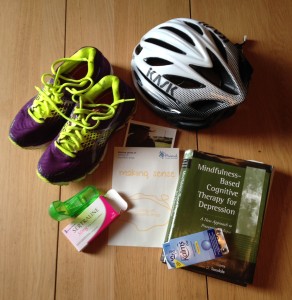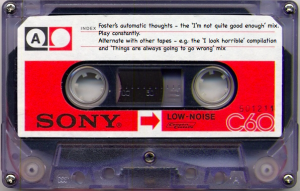Day six in Foster’s brain and all is reasonably calm…
 As I write I’m on the sixth day without any form of SSRI at all. This is new territory for me. I’ve taken them every day for 15 years (with terrible healthcare making it much trickier).
As I write I’m on the sixth day without any form of SSRI at all. This is new territory for me. I’ve taken them every day for 15 years (with terrible healthcare making it much trickier).
Three months ago I moved to Sertraline. Two months ago I was down to 1/4 of a tablet per day. Then I started alternating days. One month ago I moved to one day on and two days off. Over the Christmas break I’ve been attempting one day on and three days off. This time round when it got to day four off I decided to keep going.
It’s been a LONG time coming. I’ve been bobbing around the 20-30mg mark for years. I tried to come off them in 2008 but didn’t get below 10mg Citalopram before an abortion and a move to London meant I needed more support again. I tried in 2012 but again couldn’t drop below 10mg. In 2014 I got to 5mg before it became unbearable and ended up slowly and frustratingly working my way back up to 20mg.
Dealing with withdrawal symptoms
My chest sometimes feels uncomfortably tight and I’m still welling up at the slightest thing but I haven’t had any big uncontrollable surges of irritability (horrible), anger (scary) and panic (painful) since before New Year. The worst day was the first time I got to three days without. That afternoon there was little to be done except pick my sobbing self up off the bathroom floor and breathe deeply in showers as hot as I could bear. I would lie completely still in bed hoping for sleep but fearing the threat of my mind building, rushing and slipping away into a place of panic and pain that felt unknown and terrifying. It’s really scary to feel genuinely out of control of your mind. Luckily there was only one afternoon that bad.
I only feel completely safe when I’m exercising and in the calm and blissful hours afterwards when I’m myself again. I’ve ran hundreds of miles. When my knee gave out I cycled hundreds more. I discovered spinning. I’ve been chaining Kalms and I haven’t had a good coffee or a glass of wine in weeks (interestingly when you’re recently married and of a certain age people tend not to push alcohol on you, even at Christmas!). But I’m nearly there. I really think I might be.
Luck, love and incredible patience
I’m very very lucky to have such supportive and loving friends, family, work and (most of all) my husband Alex. My family love me unconditionally even when I’m unforgivably difficult. My friends make me feel myself again just by being in their company. But Alex is endlessly patient. Those surges of anger and irritability disguise themselves as reactions to things happening day to day. They show their ugly faces in snippy comments, slamming doors and helpless tears. He recognises these as symptoms. He knows that deep down they’re not my fault. He doesn’t react to them as if they are. This is perhaps the most helpful but also the most difficult thing someone can do to support your mental health. He’s an absolute hero.
(I’ve also written about managing depression and anxiety in relationships here)
New understanding and techniques to manage my mind
There’s been plenty of dramatic lows and a few proud highs in this particular journey. But a lot of the experience of living with and managing this stuff is the day to day mental grunt work. Looking after yourself. Recognising triggers and identifying negative thoughts. I’ve been doing a lot of that too.
I love a metaphor when it comes to managing my mental health. Metaphor helps me identify  and pin down my experiences. This is a step towards understanding and managing them. It helps me regain perspective and use the language of shared experience to transfer and talk about some pretty intangible feelings.
and pin down my experiences. This is a step towards understanding and managing them. It helps me regain perspective and use the language of shared experience to transfer and talk about some pretty intangible feelings.
Over the last few months I’ve found a couple of new ways of thinking about my experiences which really help day to day. The tapes and the oil painting. I’ve written about them here: The Regret Tape and the I’m Not Good Enough Mix – new metaphors and thinking tools for managing anxiety and depression.
I don’t know what’s going to happen next and I’m going to try not to beat myself up if it doesn’t go quite as planned. But I’m cautiously pleased and proud to have made it this far. The sun is shining and I’m off out with the dog (he helps a lot too). I might even treat myself to a (decaff) coffee.
P.S – An important extra
It’s worth emphasising that I spent a long time reducing my Citalopram and then Sertraline slowly in 2015. I did the withdrawal and reduction with advice from my doctor. This is a personal account of an individual experience. Mind has a lot of great info on coming off psychiatric drugs which it’s worth looking at if it’s something you are thinking about.

Twice I have tried to come off them and both times I was back with all the dreaded symptoms within six months. Then the slow haul up again when resuming taking them. So now I am resigned to taking a low dose for the rest of my life
I came off mine completely 21st September 2018, I feel I’m having a mini breakdown, electric feeling in my head
Crying snapping and anger terrible, I don’t like being angry I judge my self a lot and fear it’s who I am
I love Buddhist quotes they keep me on track and walking the dog saves me so much, it’s feels like a break from the pain, it’s comes back shortly and I feel sad it’s not gone for ever, the ugly monster still there, I’m keeping positive by saying it will go I will battle this and the monster won’t be there having their fun for long x
Coming off antidepressants was so hard for me, I really struggled especially coming off SNRIS were even worse for me. It is a tough one but it does eventually go away.
http://www.hannahblogsmh.com
I’m in my first week of coming off them. I feel dizzy and tired sometimes angry sometimes cry for no reason. I’m determined I’m not going back on them (sertraline) I want myself back not the muted drugged version of me I’ve been for far too long.
HI Christian,
I hope you are doing ok – it’s an incredibly hard thing to do – I am back on mine now after the worst three months ever – I wrote a bit more about it here – http://www.clarerosefoster.co.uk/2016/07/what-id-tell-my-2015-self-about-dieting-body-positivity-and-accepting-medication/
For me, I think the attempt to come off made me a bit more accepting of its role in my life – and I realised that perhaps they were actually helping me be myself. But everyone’s experience of medication and side effects are different and I can totally understand that you want to come off – all I would say is don’t be too hard on yourself if you find it too difficult – and make sure you have the support in place you need while you are tapering.
Very best,
Clare x
Hi Clare
Thank you for the kind words of support, it’s very much appreciated. I have a brilliant support structure from my family and friends so hopefully I can go the distance. Sorry that you’ve had a rough few months, but good that it’s an acceptance in some parts, if you feel like “you” that’s the most important thing, medicated or not. It was good to read your experience and it made me realise a lot of things I feel or felt,I wasn’t on my own. Keep on fighting and don’t ever let it get the better of you.
Thanks
Christian